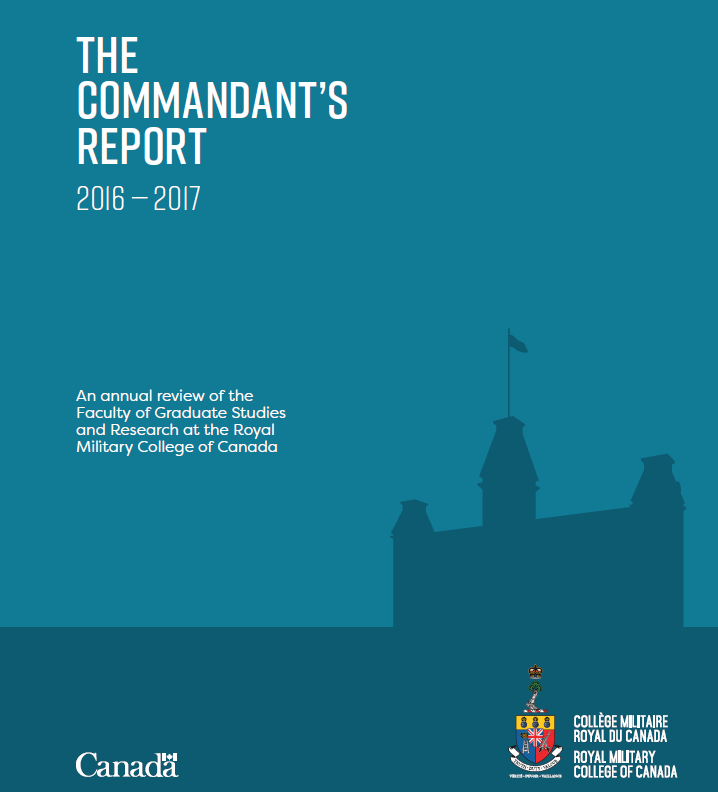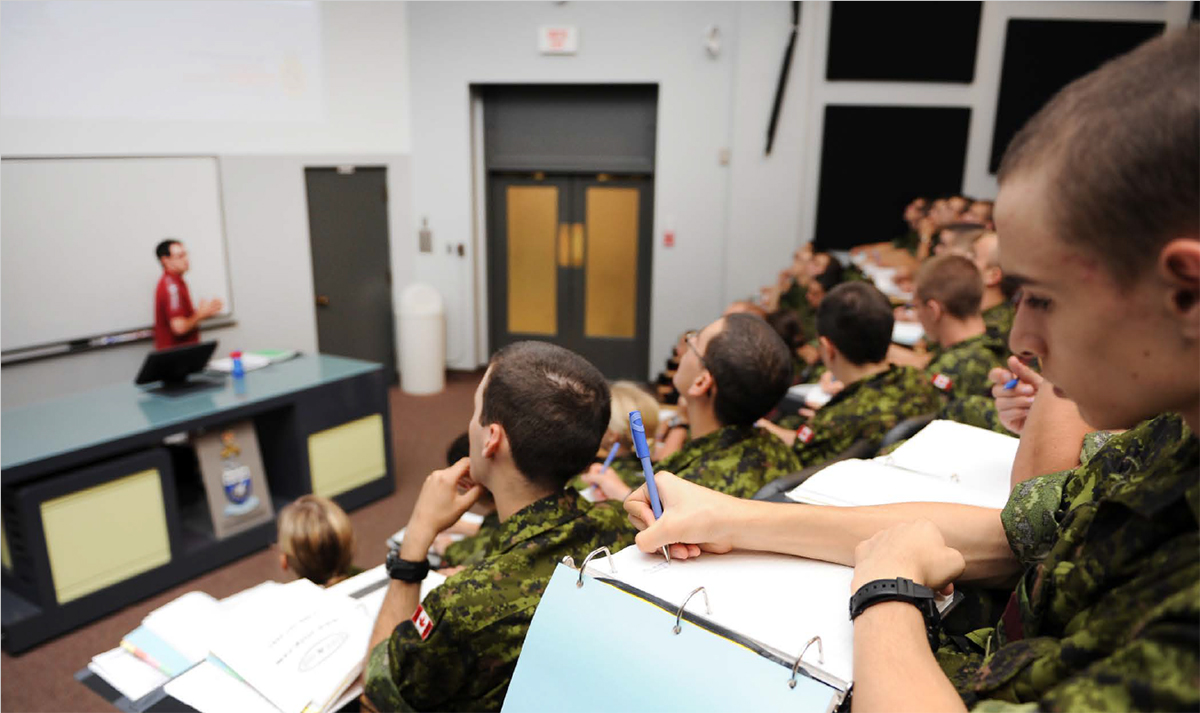This booklet provides an overview of the more detailed and fulsome version of the Commandant’s Report and includes some additional information as it relates to our leadership team, our graduate programmes, a brief outline of our research activities and provides special highlights of research excellence and some of our remarkable contributors.
A complete version of the Commandant’s Report can be obtained by contacting the Office of the Vice-Principal of Research and Dean and Graduate Studies. This annual review contains a brief description and summary of publications and presentations carried out by some of the faculty during the past year. It includes lists of classified and/or refereed reports submitted to DND and federal government departments that are not published in open literature. As well, each of the Faculties (Arts, Science, and Engineering): recognize those who have received honours and awards; report on appointments made and membership in various research committees; and provide specific details on their research funding. Although this review is intended as an inventory for the archives, it also serves as a prospectus of research direction followed at RMC for you to learn more about what we do and to follow up in those areas of particular interest to you. Questions and comments are welcome – so please do not hesitate to contact us at any time.
For more information, please contact:
Vice-Principal of Research and Dean of Graduate Studies
Royal Military College of CanadaP.O. Box 17000, Station Forces
Kingston ON
K7K 7B4
Telephone: 613-541-6000, ext. 3728
Facsimile: 613-541-6064
Email: vp-research@rmc-cmr.ca
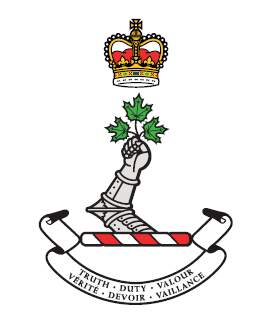
Contents:
Our leadership team
- Greetings from the Commandant
- Message from the Principal
- Quick Facts about RMC
- About the Royal Military College of Canada and the Faculty of Graduate Studies and Research
- Message from the Vice-Principal of Research and Dean of Graduate Studies
- RMC Graduate Studies and Research Team
Our programmes
- Master’s and Doctoral Programmes
- Graduate Studies Enrolments 2016-2017
- Graduate Degrees Awarded 2016-2017
Graduate research activities
- Publications, Proceedings and Presentations by Divisions 2016-2017
- Research Funding at RMC
Highlights of research excellence
- SLOWPOKE-2 Reactor
- Environmental Sciences Group
- Canadian Institute for Military and Veteran Health Research
- Computer Security Laboratory
Advancing inquiry-based research
- Canada Research Chairs
- The Royal Society of Canada
- The Governor General’s Academic Medal
- The Cowan Prize for Excellence in Research
- The Three Minute Thesis (3MT®)
Greetings from the commandant
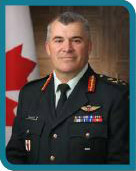 As Commandant of the Royal Military College of Canada, I am pleased to present the 2016–2017 Commandant’s Report – an annual review of the Faculty of Graduate Studies and Research.
As Commandant of the Royal Military College of Canada, I am pleased to present the 2016–2017 Commandant’s Report – an annual review of the Faculty of Graduate Studies and Research.
Much has happened since the Military College of Canada first opened its doors in 1876 to the first class of cadets in Kingston as a means to prepare young Canadians for military service as commissioned officers. Two years later, Queen Victoria granted the College the right to use the prefix “Royal”. During its first 75 years, the four-year education programme left its graduates with a strong ability in engineering as well as a solid foundation in the humanities. Beginning in the 1950s, the College extensively studied officer professional development and education from the perspectives of knowledge, skills and intellectual capacity, and redefined the fundamental learning requirements which officers would need to meet throughout their careers. As a result, RMC expanded its mandate to become a complete post-secondary institution offering degrees at the bachelor’s, master’s and doctoral levels.
The Royal Military College of Canada Degrees Act, 1959 empowers the College to confer degrees in arts, science, and engineering and it is the only federal institution in Canada with the authority to do so. The Division of Graduate Studies was established in 1959 and four years later, underwent a title change to the Division of Graduate Studies and Research (DGSR). The first graduate degree was granted in 1966. DGSR now offers graduate programmes – to officers of the Canadian Armed Forces (CAF) and to civilians – at the master and doctoral levels in key areas of engineering, humanities, social sciences and science on site as well as by distance learning through the Division of Continuing Studies.
This report underscores the scope and breadth of research that is conducted at the College and it is a clear testament to the fact that academics at RMC is thriving. Our faculty and students have access to research facilities that are among the best in Canada. Our students will also be mentored by faculty supervisors that are heavily invested in research and recognized as experts at the international level. Today, after more than fourteen decades since the establishment of the College, it continues to exemplify the values enshrined in the quality of education offered at this fine institution.
Brigadier-General Sébastien Bouchard, OMM, MSM, CD
Message from the principal
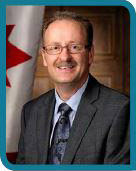 With a rich history that dates back over 140 years, RMC stands proudly, as an institution of excellence because of the people working here who dedicate themselves to inspiring the excellence expected from RMC. The people who make up this learning institution – faculty, staff and students, alike – come together in keeping with the College vision of “One College Team – innovating, adapting and renewing to align with the evolving needs of the Profession of Arms.” It is the team’s efforts, professionalism and determination that enables us to realise our goal of leading in university education and research that is responsive to the evolving needs of the CAF, Government of Canada, and Canadian society.
With a rich history that dates back over 140 years, RMC stands proudly, as an institution of excellence because of the people working here who dedicate themselves to inspiring the excellence expected from RMC. The people who make up this learning institution – faculty, staff and students, alike – come together in keeping with the College vision of “One College Team – innovating, adapting and renewing to align with the evolving needs of the Profession of Arms.” It is the team’s efforts, professionalism and determination that enables us to realise our goal of leading in university education and research that is responsive to the evolving needs of the CAF, Government of Canada, and Canadian society.
Sustained by a commitment to teaching, research and service, our focal areas are education, exploration and engagement. In support of our goal, the College commits to educate to the highest level, providing quality education at the undergraduate and graduate level. To explore, RMC embraces a culture of innovation, generating, transferring and sharing knowledge in research that is Defence, security and whole of government relevant as well as inquiry-based. Finally, the College continues to engage stakeholders and subject matter experts and contribute to the broader academic, professional, Defence & security and government communities.
The Government of Canada is taking a lead role in helping make significant contributions and investments into its Defence team and the people of Canada. As outlined in the government’s 2016-2017 Canadian defence policy “Strong, Secure, Engaged”, it details a new vision for the Defence team for the coming decades. “It is about our contribution to a Canada that is strong at home, secure in North America, and engaged in the world.” The policy places particular focus on people and takes an aggressive posture on reinvesting and modernizing the core capabilities of the CAF. To complement the government’s efforts to better understand the dynamic root causes of conflict and complex geopolitical developments, the Defence team will launch a revitalized partnership with external experts to capitalize on the extensive expertise of Canadians. This will include new support and funding for scholarship programmes for graduate students interested in defence and security, and engagements and events that promote dialogue in the defence community.
Dr. H.J. (Harry) Kowal, CD, rmc, Beng, MSAe, MA(SS), MDS, PhD, PEng, BGen (Ret’d)
 Quick facts about RMC
Quick facts about RMC
141
years of history
RMC has a 141-year history of providing outstanding leadership for the CAF, government and business across Canada and around the world.
RMC is one of two Canadian Military Colleges (the other being RMC Saint-Jean), which confers highly respected degrees, and offers a wide variety of undergraduate and graduate-level programmes to serving members of the CAF, to employees from the Government of Canada as well as the public.
533
graduate students
2016-2017 enrolment included 56 doctoral students. 54.2% of all graduate students attend on a part-time basis.
236 graduate
degrees awarded
Nine doctorates and 227 degrees at the master’s level were awarded during 2016-2017.
$13.1 million
research funding
Research funding is derived from a wide range of sources including government, industry and private enterprise. During 2016-2017, RMC received an additional grant of $956,000 from the research support fund to support indirect costs of research.
1959
Division of Graduate Studies was established in 1959 with a title change of Division of Graduate Studies and Research in 1963. First graduate degree granted in 1966.
27 graduate
studies programmes
RMC offers 27 graduate studies opportunities, including nine doctorates.
1003 research publications, proceedings, and presentations
As recognized experts, faculty members are deeply involved in research shining on both national and international stages. They have made more than a thousand contributions during 2016-2017.
5 Canada Research Chairs
RMC has a total of five Canada Research Chairs (CRC) who are leaders in the fields of: electromagnetic engineering; war studies; ecotoxicogenomics and endocrine disruption; self-assembly and nanomaterials; and aeronautical fluid mechanics.
During 2016-2017, the CRC programme awarded the college a grant of $700,000 to support our world-renowned researchers and their teams to establish ambitious research programmes.
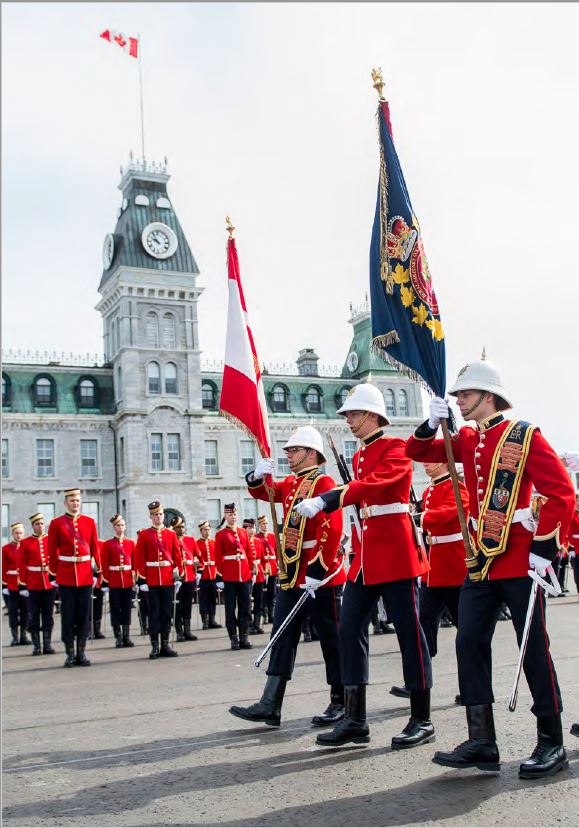
About the Royal Military College of Canada and the Faculty of Graduate Studies and Research
The Royal Military College of Canada delivers an education founded in the profession of arms and produces officers with the mental, physical and linguistic capabilities required to lead with distinction in the Canadian Armed Forces. All of RMC’s undergraduate academic programmes, together with a range of complementary programmes, are offered in both official languages. As a provincially chartered university, recognized as Canada’s military university, RMC also provides undergraduate and graduate programmes, as well as professional military education, both on campus and at a distance, to meet the needs of other members of the CAF and the Department of National Defence (DND). A national institution, RMC conducts research and shares knowledge in keeping with a modern university and seeks out opportunities that support the Defence Policy, the Government of Canada and Canadian society.
The Faculty of Graduate Studies and Research is multifaceted. It offers advanced degree programmes and professional development to graduate students in engineering, science, and the social sciences & humanities. The Faculty encourages research projects that sustain excellence in both graduate and undergraduate academic programmes and support the research and educational needs of DND and across government, through collaboration and alliance with various agencies such as the Defence Research and Development Canada, Defence Research Establishments, Materiel Group, Communications Security Establishment, Canadian Forces Network Operations Centre, Operational Commands, Engineering occupations, The Royal Canadian Mounted Police, Shared Services Canada and Public Safety Canada, to name a few.
Message from the Vice-principal of Research and Dean of Graduate Studies
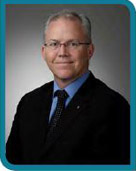
Since the establishment of the Division of Graduate Studies and Research nearly six decades ago, it has become an intellectual crossroads where strong fundamental research underpins an extensive programme of sponsored research to address the needs of our partners and stakeholders. Faculty enjoy the essentials of full academic freedom whilst still exhibiting a strong interest and collaboration in defence-related research challenges and opportunities. It is this backbone of research excellence that establishes the university’s essential capacity to deliver outstanding education to our students, both graduate and undergraduate. Amongst all Canadian universities, RMC is uniquely challenged to train the future CAF officer corps and develop excellence in research within the government sector and the greater community. According to RE$EARCH Infosource Inc., RMC was placed in the top 50 research universities, ranking 41st for the years 2016-2017. Over the medium to long term, RMC is poised to increase its level of research income and anticipate returning to a placement of high 30s previously achieved.
Consultations undertaken during the recent Defence Policy Review underscored the importance and value of informed discussion of defence issues. The CAF has had a long-lasting and productive relationship with academia and derives significant benefit from stimulating and leveraging the well-established intellectual capacity resident in this community. Collaboration with academia and other experts not only strengthens the foundation of evidence-based defence policy-making, but also helps drive innovation and develop future thought leaders. As part of the Government’s vision, RMC will seek to stimulate increased research on defence and security issues in Canada, and is mindful of the need for a diverse spectrum of voices contributing to the conversation in this field. To enhance its relationship with and derive greater benefit from Canada’s rich academic and analytic community, the Defence team will increase investment in academic outreach to $4.5 million per year in a revamped and expanded defence engagement programme. To this end, the programme will include: a collaborative network of experts; a new scholarship programme for masters and postdoctoral fellows; and an expansion of the existing expert briefing series and engagement grant programme. Those who decide to join us will not only benefit from being part of a world-class research environment but also be among a wide network of colleagues, partners and collaborators found across government, industry and the greater Defence and security community.
Dr. Pat Heffernan, CD, rmc, BEng, MASc, PhD, PEng
RMC Graduate Studies and Research team
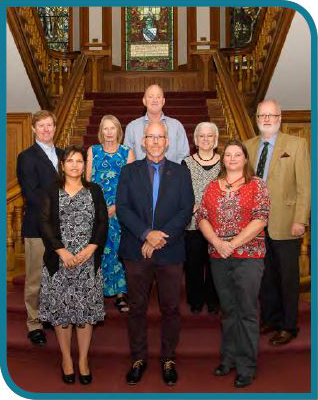
(left to right):
Front row:
- Raja Abaab - Research Administration Support,
- Dr. Pat Heffernan - Vice-Principal of Research and Dean of Graduate Studies,
- Julie Hamel - Administrative Officer, Division of Graduate Studies and Research;
Middle row:
- Kurt Schobel - Associate Vice-Principal Research (Finance),
- Caroline Stephenson - Financial Clerk,
- Viviane Pelletier - Research Finance Manager,
- Dr. Mike Hennessy - Associate Vice-Principal Research;
Back row:
- Steven Beattie - Research Financial Assistant;
Absent:
- Ken Rochon - Financial Assistant; and
- Susan Amey - Financial Assistant
The RMC Graduate Studies and Research team, shown above, provides key dedicated support to faculty, students and partners for the development, implementation and optimization of ongoing and emerging research activities. In addition to their extensive knowledge and experience in the areas of governance, project management, grants and partnerships – the members of the research team have the theoretical, methodological and practical skills and expertise that support concerted efforts and collaboration in research activities. It is this Graduate Studies and Research team that help form the shape of innovative research at RMC.
Our programmes
Master’s & doctoral programmes
The faculty of Graduate Studies and Research at the Royal Military College of Canada offers advanced degree programmes, as well as professional development to postgraduate students in key areas, such as, engineering, science, social sciences and humanities. Interested candidates may consider the following graduate studies opportunities leading to the following master’s or doctoral degree programmes.
Master of Business Administration (M.B.A.)
Master of Defence Studies (M.D.S.)
Master of Public Administration (M.P.A.)
Master of Applied Science (M.A.Sc.)
- Aeronautical Engineering
- Chemistry and Chemical Engineering
- Civil Engineering
- Electrical and Computer Engineering
- Mechanical Engineering
Master of Arts (M.A.)
- War Studies
Master of Engineering (M.Eng.)
- Aeronautical Engineering
- Chemistry and Chemical Engineering
- Civil Engineering
- Electrical and Computer Engineering
- Mechanical Engineering
Master of Science (M.Sc.)
- Chemistry and Chemical Engineering
- Computer Science
- Mathematics
- Physics
Doctor of Philosophy (Arts)
- War Studies
Doctor of Philosophy (Engineering)
- Chemistry and Chemical Engineering
- Civil Engineering
- Electrical and Computer Engineering
- Mechanical Engineering
Doctor of Philosophy (Science)
- Chemistry and Chemical Engineering
- Computer Science
- Mathematics
- Physics
Graduate studies enrolments 2016-2017
During this academic year, RMC offered seventeen options to complete a degree at the master’s level as well as nine options at the doctoral level. The number of graduate studies enrolments over the last five years (2012-2017) has remained stable – with an average variance of about three percent. Doctoral students make up approximately ten percent of the College’s total enrolment and within this group over three-quarters attend on a full-time basis. As is expected, the greater portion of the graduate students are at the master’s level and it should be noted that nearly sixty percent within this group undertake their studies on a part-time basis.
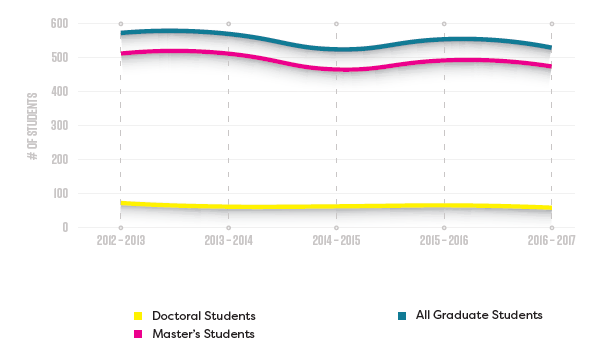 For each year between 2012 and 2017
For each year between 2012 and 2017
- there were between 50 and 100 doctoral students, and
- between 400 and 550 master's students,
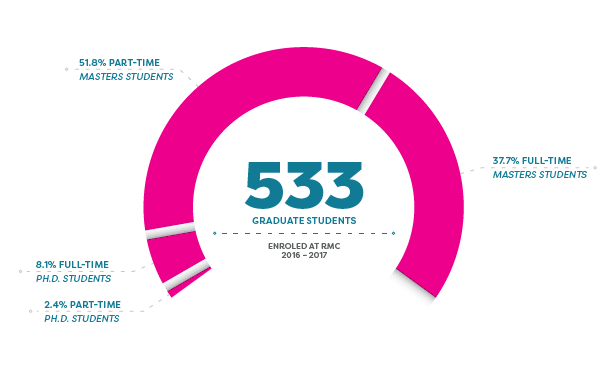 533 graduate students were enrolled at RMC during the 2016-2017 academic year, where
533 graduate students were enrolled at RMC during the 2016-2017 academic year, where
- 2.4% were part-time Ph.D. students,
- 8.1% were full-time Ph.D. students,
- 51.8% were part-time master's students, and
- 37.7 percent were full-time master's students.
Graduate Degrees Awarded 2016-2017
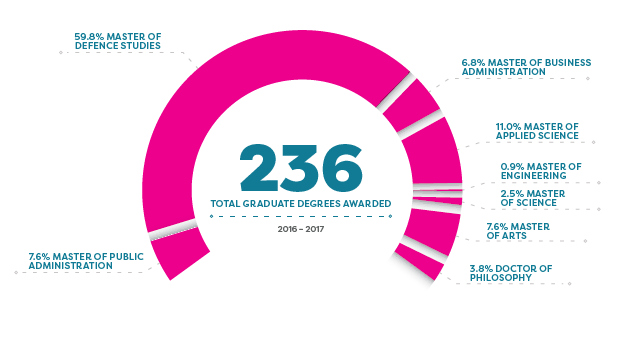
- 7.6% were Masters of Public Administration,
- 59.8% were Masters of Defence Studies,
- 6.8% were Masters of Business Administration,
- 11.0% were Masters of Applied Science,
- 0.9% were Masters of Engineering,
- 2.5% were Masters of Science,
- 7.6% were Masters of Arts, and
- 3.8% were Doctors of Philosophy.
| Doctor of Philosophy | 2016–2017 |
|---|---|
| Chemistry and Chemical Engineering | 2 |
| Electrical and Computer Engineering | 2 |
| Mechanical Engineering | 3 |
| Mathematics | 1 |
| Physics | 1 |
| Master of Arts | 2016-2017 |
|---|---|
| War Studies | 16 |
| Security & Defence Management & Policy | 2 |
| Master of Science | 2016-2017 |
|---|---|
| Chemistry and Chemical Engineering | 3 |
| Computer Science | 1 |
| Physics | 2 |
| Master of Engineering | 2016-2017 |
|---|---|
| Aeronautical Engineering | 1 |
| Civil Engineering | 1 |
| Master of Applied Science | 2016-2017 |
|---|---|
| Aeronautical Engineering | 7 |
| Chemistry and Chemical Engineering | 9 |
| Civil Engineering | 8 |
| Electrical and Computer Engineering | 1 |
| Mechanical Engineering | 1 |
| Others | 2016-2017 |
|---|---|
| Master of Business Administration | 16 |
| Master of Defence Studies | 141 |
| Master of Public Administration | 18 |
Total degrees awarded 236
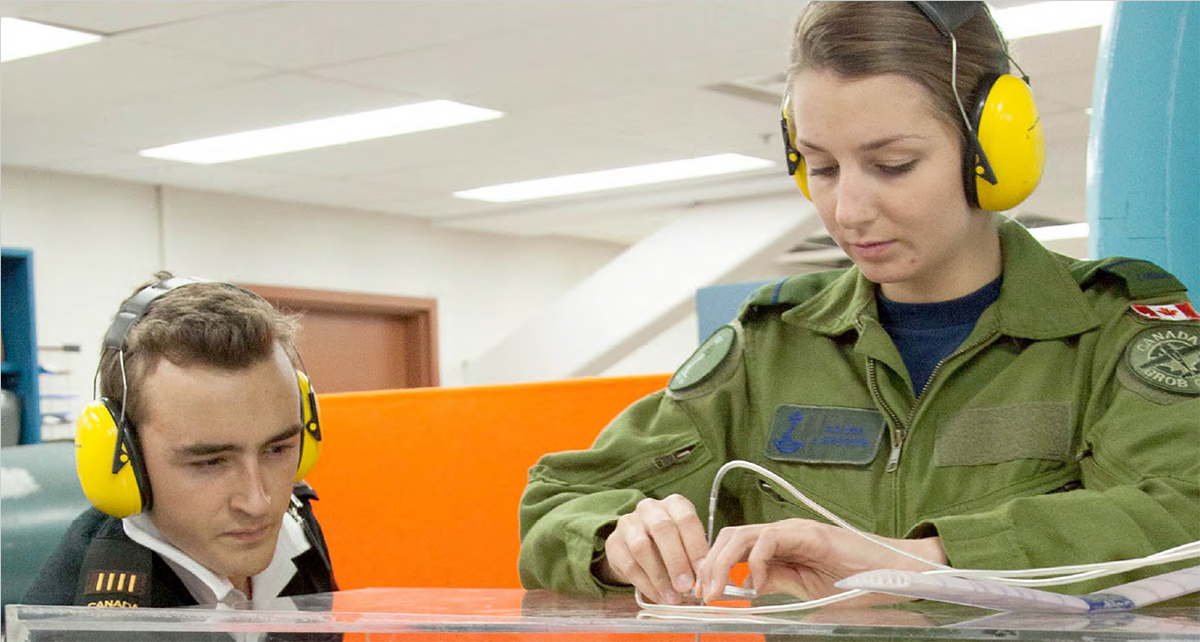
Graduate research activities
Graduate research activities
Publications, proceedings, and presentations by divisions 2016-2017
Royal Military College of Canada faculty members are deeply involved in research producing hundreds of refereed publications and books annually. Their participation on national and international stages as recognized experts in their field is evidenced by the large numbers of invited papers and lectures that are given in a wide range of venues. During the period of 2012 to 2016, the total average number of publications, proceedings and presentations made by faculty members has averaged at about 940 per year, with the last year finishing at 6.7 percent above the average. A similar pattern exists for the various divisions, with 2016-2017 showing an increase of 7.5 percent for the arts faculty, 4.1 percent for the science faculty, and 10.1 percent for the engineering faculty.
 Of 1003 research publications, proceedings, and presentations in 2016-2017,
Of 1003 research publications, proceedings, and presentations in 2016-2017,
- 7.3% were books and book chapters,
- 9.2% were articles published in nonrefereed journals and book reviews,
- 22.9% were articles published in refereed journals,
- 19.5% were conference proceedings,
- 9.6% were titles: classified / refereed government reports, and
- 31.5% were oral and poster presentations.
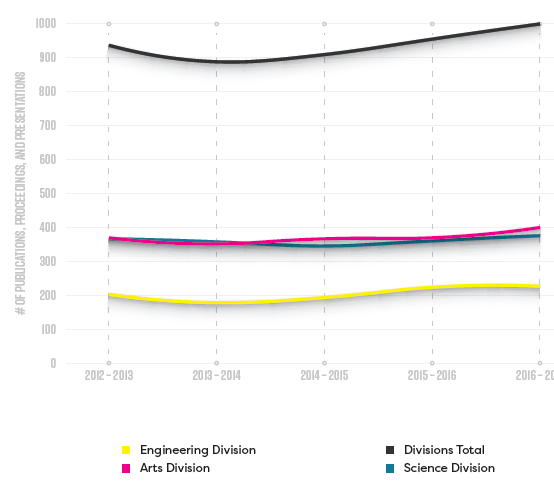
Graduate research activities
Research funding at RMC
The College has posted a strong gain in their graduate research income. During the period 2015-2016 to 2016-2017, its funding increased by 10.4% from $11.7 million to about $13.1 million – mainly due to an increase in collaborative DND sponsored research. However, the totality of the research funds came from a wide range of sources including DND and RMC (nearly $9.3 million), other federal government departments (nearly $1.2 million), as well as the funding received from the three federal granting agencies known as the Tri-Council: the Natural Sciences and Engineering Research Council (NSERC); the Social Sciences and Humanities Research Council (SSHRC); and the Canadian Institutes of Health Research (CIHR). RMC received support from the first two financial councils at a total of nearly $2.3 million. To make special note of a few of the grants obtained from among sixteen Tri-Council programmes: a Collaborative Research and Development Grant in the amount of over $195,000 (NSERC); a Discovery Grant (NSERC) at $693,000; an Insight Grant at nearly $43,000 (SSHRC); and $700,000 for the Tier One and Tier Two Canada Research Chairs programme (NSERC and SSHRC).
 From a total of $13,076,331 in funding,
From a total of $13,076,331 in funding,
- 66.6% was DND - non baseline funds,
- 0.5% was industrial grants,
- 2.0% came from private enterprise,
- 8.8% from the federal government,
- 0.6% from a provincial government,
- 16.7% from tri-council,
- 0.6% from tri-council external, and
- 4.2% from RMC internal sources.
RMC’s research capacity is critically supported by the Research Support Fund (RSF) established by the Tri-Council which is designed to offset the large financial burden of the indirect costs of research. During the reporting period of 2016-2017, grants amounted to nearly $956,000 without which the research objectives of the university and our stakeholders could not be met.
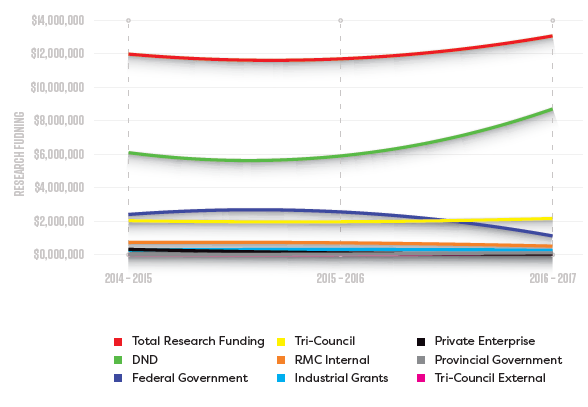
Total Research Funding for the periods 2014-2015 was near $12,000,000, dipped slightly in 2015-2016, and rose to over $13,000,000 in 2016-2017. DND's contribution for that period started at just over $6,000,000, dipped just under that figure and then rose to over $8,000,000 in 2016-2017. The federal government contributed just over $2,000,000 in 2014-2015, and that rose slightly in 2015-2016, but dropped to around $1,000,000 in 2016-2017. Tri-Council's contributions remained close to level at around $1,000,000 for the entire period, and RMC Internal, Industrial Grants, Private Enterprise, the Provincial Government, and Tri-Council External funding were also nearly level each at $500,000 or below.

Highlights of research excellence
Research excellence
Slowpoke-2 reactor
The Slowpoke-2 Facility at RMC provides a Centre of Excellence on nuclear matters within DND to meet related operational, educational and research needs in a classified environment. The reactor was commissioned in 1985 at RMC in Kingston. Since that time, the reactor has become a valued instrument for the CAF and a range of other government departments and international partners. The reactor provides an important capability for the Government of Canada by contributing to the education of CAF personnel, operational readiness, Canadian nuclear and radiological expertise, rapid response for environmental and nuclear forensics analysis, and nuclear emergency response.
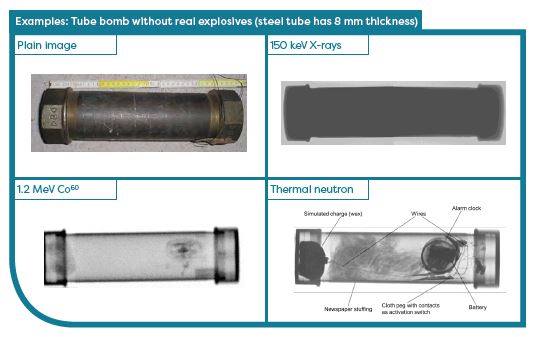 Examples: Tube bomb without real explosives (steel tube has 8 mm thickness)
Examples: Tube bomb without real explosives (steel tube has 8 mm thickness)This montage illustrates a comparative use of various imaging techniques attempting to detect the contents of a steel tube bomb without real explosives. The results are that the application of x-rays and gamma rays (Cobalt) are not very effective and that the use of thermal neutron from the SLOWPOKE-2 reactor show best results in identifying the various inside parts of the simulated bomb. Four images shown and compared: a plain image, using 150 kev X-rays, using 1.2 mev Co60, and Thermal neutron - the only one revealing simulated charge (wax), newspaper stuffing, cloth peg with contacts as activation switch, battery, alarm clock, and wires
For over 30 years, the reactor’s uses have expanded to include support to new operational requirements, understanding of new threats, and contributing to Canadian Government expertise. For example, these efforts include research on Weapons of Mass Destruction, preparation of radioisotopes for nuclear technology training, and provision of expertise to support the Canadian delegation to the International Atomic Energy Agency (IAEA), Vienna. The reactor also enhances the education and research at RMC by providing an in-situ hands-on experience for its undergraduate and graduate students. Staff at RMC use the reactor and it is supporting:
- Undergraduate training and education of RMC officer cadets;
- Postgraduate training of military officers;
- Non-destructive evaluation of components, such as composite aircraft parts and cartridge activated initiators to ensure operational readiness;
- Radiation monitoring for visiting NATO nuclear vessels in Canadian ports;
- Development of small modular reactors to support energy demands in remote locations;
- Cosmic radiation exposure studies of CAF and NATO flight crews; and
- Forensic analysis of illicit special nuclear and radiological materials.
Currently the Crown owns three reactors: two are at Chalk River Laboratories (CRL) and the third is at RMC. However, of the two reactors at the CRL, one reactor is only used for fundamental reactor physics measurements, while the second reactor, which was used to support the CANDU industry, was decommissioned on 31 March 2018. Unlike these two larger and dedicated research reactors, the smaller, simpler and safe reactor at RMC provides an accessible and multifunctional capability to the Defence Team. Direct access to the reactor by the CAF allows for in-house research to undertake classified work, meet time sensitive operational demands or to develop the cadre of nuclear and radiological expertise.
Through the years, funds have been spent wisely to maintain and constantly improve the reactor (e.g. Change from an analogue to a modern digital control system) and its capabilities (e.g. Delayed neutron counting system (DNC), neutron radiography and in-pool irradiation), all developed in-house and unique to this reactor. Nuclear forensic capability developed at RMC ensures a unique role the CAF plays in the event of a nuclear/radiological event. This capability does not exist at any other facility in Canada. The DNC is recognized as an important national counterterrorism capability.
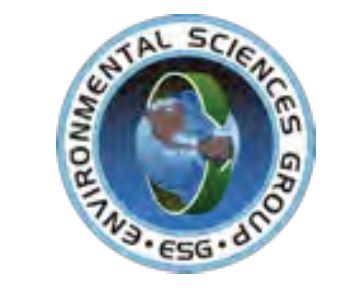
Research excellence
Environmental Sciences Group
Who we are – Founded in 1989 at the Royal Military College of Canada, the Environmental Sciences Group (ESG) is a unique, internationally recognized multidisciplinary team providing scientific expertise for the management of contaminated sites to government organizations, scientists, private industry and international partners. The 75-person team includes 38 scientists and environmental experts (including eight PhD) specializing in contaminated site assessment, remediation, risk assessment and monitoring with a focus on remote sites and issues/contaminants of emerging concern. Projects are often large in scope and incorporate scientific outreach and communication, particularly involving Indigenous Peoples.
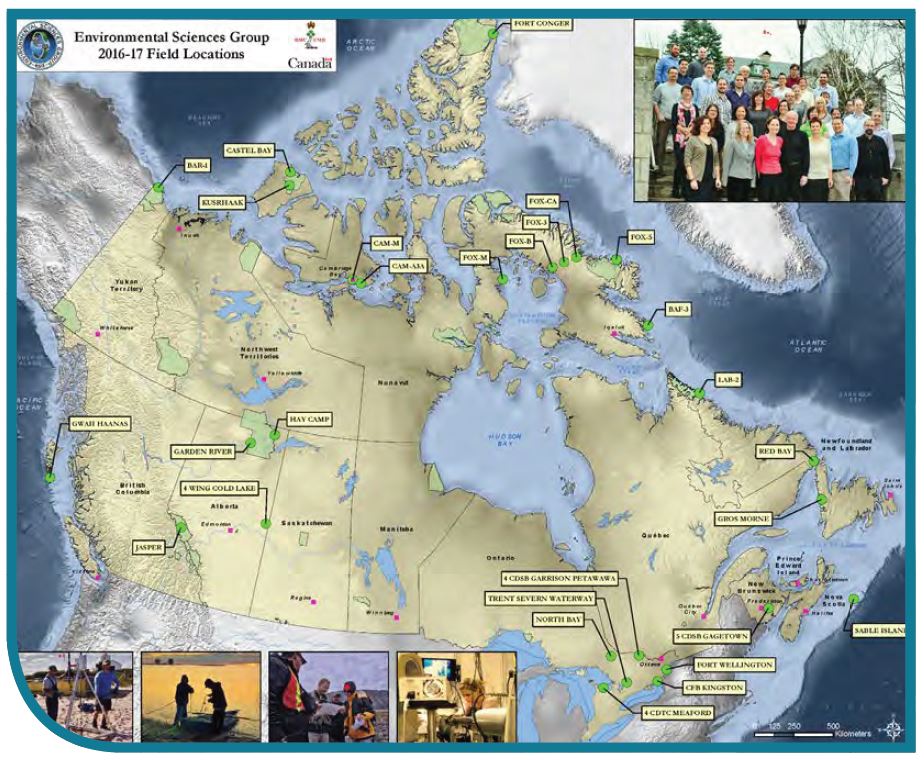
- Fort Conger,
- BAR-4,
- Kushrhaak,
- Castel Bay,
- CAM-M,
- CAM-A&A,
- Fox-M,
- Fox-B,
- Fox-J,
- Fox-CA,
- Fox-5,
- BAF-J,
- Gwar Haanas,
- Jasper,
- Garden River,
- 4 Wing Cold Lake,
- Hay Camp,
- 4 CDSB Garisson,
- Petawawa,
- Gros Morne,
- Red Bay,
- Lab-2,
- Trent-Severn Waterway,
- North Bay,
- 4 CDTC Meaford,
- CFB Kingston,
- Fort Wellington,
- 5-CISB Gagetown,
- Sable Island
For example, ESG provided scientific leadership for the 25-year, $575M DND Distant Early Warning (DEW) Line Cleanup Project. ESG has been recognized through many awards including two Deputy Minister of National Defence Commendations: for “…the creation of an internationally recognized centre of excellence in environmental research” and for “work with Inuit and First Nations…and the restoration of Arctic contaminated sites.”
- 2016/2017 Applied Project Highlights
- Since the programme’s inception in 2005, ESG has continuously participated in the 4.5-billion dollar Federal Contaminated Sites Action Plan (FCSAP). As a part of this initiative, ESG supports site custodians (e.g. DND, Parks Canada) and scientific expert support departments (Fisheries and Oceans Canada, Environment and Climate Change Canada, Health Canada) through the development of practical and scientifically sound approaches towards closing legacy contaminated sites and reducing federal liabilities. In 2016, ESG was engaged in 30 projects supported by the FCSAP. Novel tools employed in 2016 included real-time high-resolution contaminant mapping techniques to develop more accurate conceptual site models for remediation and risk management, and conducting source connectivity studies in a fractured rock environment.
- 2016/2017 Research Initiatives
- Through support from the Natural Sciences and Engineering Research Council of Canada (NSERC) and other granting agencies 37 graduate students, postdocs and research associates were trained and contributed to a number of scientific developments. The year saw developments in the area of emerging contaminants including the assessment, analysis, and remediation of per- and polyfluoro alkyl substances (PFAS). In 2016 ESG’s director, Dr. Kela Weber, helped teach and organize a NATO international summer school in Halifax, Nova Scotia, on the topic of underwater munitions. The fate of dumped and abandoned munitions in water bodies is a topic of developing concern worldwide.
- Significant 2016-2017 landmarks:
-
- 100th Canadian Armed Forces deployed operation supported.
- 500th ESG environmental professional hired.
- 900th Technical report published.
Research excellence
Canadian Institute for Military and Veteran Health Research (CIMHVR)
In 2010, the Canadian Institute for Military and Veteran Health Research (CIMVHR) was co-founded by RMC and Queen’s University. CIMVHR has now built a network of over 1700 researchers, 43 Canadian universities and 10 global affiliates who have agreed to work together to address the health research requirements of military personnel, Veterans and their families.
RMC Professor, Dr. Stéphanie Bélanger is the Associate Scientific Director of the institute. She also instructs the annual CIMVHR webinar, issues in the health of military personnel veterans and their families, offered through RMC’s Master of Public Administration programme. In 2017, webinar students heard from 18 subject matter experts throughout the semester.
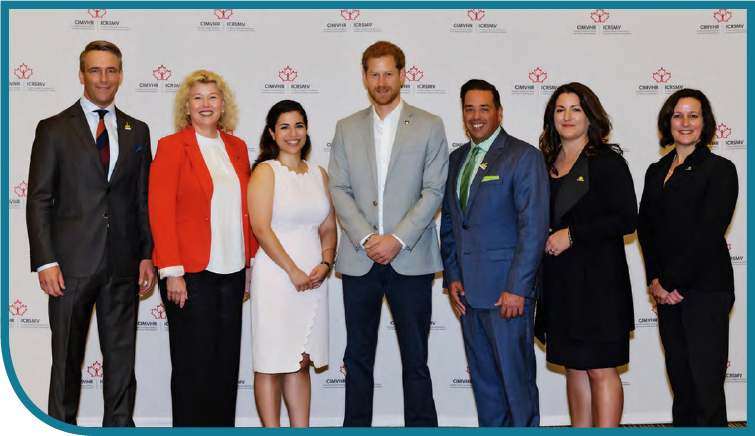 In conjunction with his attendance at the Invictus Games Toronto 2017, HRH Prince Harry spoke at the opening session of CIMVHR Forum 2017. He is pictured here with (L to R) CEO Invictus Games Toronto 2017 Michael Burns; CIMVHR Fellow Dr. Alice Aiken; CIMVHR Researcher Dr. Celina Shirazipour; Invictus Games Athlete, Leading Seaman (Retd) Stéphane Moreau; and CIMVHR Interim Co-Scientific Directors Drs. Heidi Cramm and Stéphanie Bélanger
In conjunction with his attendance at the Invictus Games Toronto 2017, HRH Prince Harry spoke at the opening session of CIMVHR Forum 2017. He is pictured here with (L to R) CEO Invictus Games Toronto 2017 Michael Burns; CIMVHR Fellow Dr. Alice Aiken; CIMVHR Researcher Dr. Celina Shirazipour; Invictus Games Athlete, Leading Seaman (Retd) Stéphane Moreau; and CIMVHR Interim Co-Scientific Directors Drs. Heidi Cramm and Stéphanie BélangerThe official Journal of CIMVHR, the Journal of Military, Veteran and Family Health (JMVFH), is an online, open access, scholarly journal. In 2017, 14 articles were published in two issues of JMVFH by 57 authors and co-authors from 29 organizations.
In 2017, the 8th Annual Military and Veteran Health Research Forum was hosted by CIMVHR in partnership with Invictus Games Toronto 2017. CIMVHR, the official research partner of the 2017 games, hosted the annual 3-day conference in Toronto overlapping with the games. CIMVHR Forum 2017 gathered researchers, clinicians, students, military, Veterans, first responders and industry to exchange valuable knowledge, optimize networking capacity, and build new collaborations focused on research initiatives that improve the health and well-being of Canadian military personnel, Veterans and their families. Over the course of the conference, 173 researchers delivered 198 research presentations to over 600 delegates.
The institute acts as a conduit between the academic community and research funding organizations. In 2017 alone, CIMVHR distributed eight calls for proposals from its Public Service and Procurement Canada contract, totalling $1.4M that were assigned to researchers from eight university members. In the same year, CIMVHR also funded seven research projects across Canadian universities under the Advanced Analytics Initiative, with IBM, at a total value of $12M.
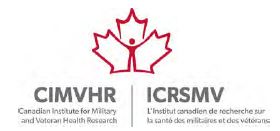
Research excellence
Computer Security Laboratory
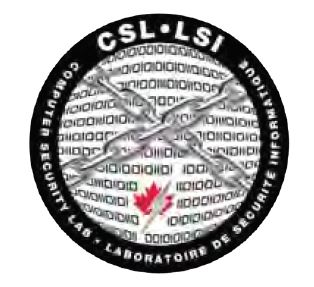
The RMC Computer Security Laboratory, commonly referred to as the CSL, is one of the foremost research groups tackling computer, network and cybersecurity research in Canada. The CSL is located in the Electrical and Computer Engineering (ECE) Department at RMC and its researchers have many collaborations with colleagues from other RMC departments and many other universities. The CSL’s Primary Investigator is Dr. Scott Knight who founded the CSL in the late 1990s following a close collaboration with the Canadian Forces Information Operations Group.
The CSL is comprised of approximately 20 researchers. Dr. Knight is joined by five additional investigators, namely Dr. Sylvain Leblanc, Dr. Ron Smith, Dr. Greg Phillips, Dr. Vincent Roberge and Mr. Brian Lachine along with a large number of researchers and graduate students. CSL Investigators pride themselves in the applicability of their research in support of DND and the CAF. The CSL current research partners include the Royal Canadian Air Force (Directorate of Technical Airworthiness & Engineering Support), the Royal Canadian Navy (Directorate Naval Platform Systems), and the Canadian Army (Directorate Land Equipment Programme Support), along with the Canadian Force Information Operations Group, and other government departments such as the Canadian Forces Network Operations Centre (CFNOC) and the Communications Security Establishment Canada (CSE). The collaborations between the CSL and the Canadian Armed Forces’ Directorate of Cyber Operations Forces Development (D Cyber Ops FD) at National Defence Headquarders is such that a four-person detachment of D Cyber Ops FD is collocated with the CSL at RMC.
CSL investigators have researched in many traditional information technology areas such as intrusion detection, covert channel analysis and detection, as well as protocol and system vulnerability analysis. Research into the application of cyber security concepts to platforms such as weapon systems, aircraft, ships and land vehicles is the CSL most recent endeavour that has significant benefits to the CAF.
CSL Investigators are all heavily involved in the ECE’s undergraduate computer engineering programme and graduate programme where it is the sole provider of the officer specialty specification Computer Network Security (AKQX) for the CAF. Research also finds in the CSL’s Short Course Programme, which offers courses of five to ten days to members of the CAF, both non-commissioned members (NCM) and officers, as well as civilian employees from DND and other governmental departments, in situ at RMC Kingston or remotely in Ottawa.
The RMC Computer Security Laboratory – research applicable to Canada’s defence community!
 RMC CSL - Applied Research
RMC CSL - Applied Research
Core CSL
- Five full time civilian professors and a number of military faculty
- One lab architect
- One contract professor
D Cyber FD Detachment
- One Major
- Two Captains
- One NCM technician
External Support / Technical Investigations
- Cyber operational support - D Cyber FD, CFNOC, CSE
- Project Support - RCN, CA, RCAF
- Executive presentations and awareness briefings
- Lectures and classes within professional development courses
Military and Government of Canada Education
- four, 1-2 week courses to DND and governments partners
University education and research
- Three undergraduate and seven graduate Cyber courses
- Research
- Individual research; Advising undergraduate, master and PhD candidate research;
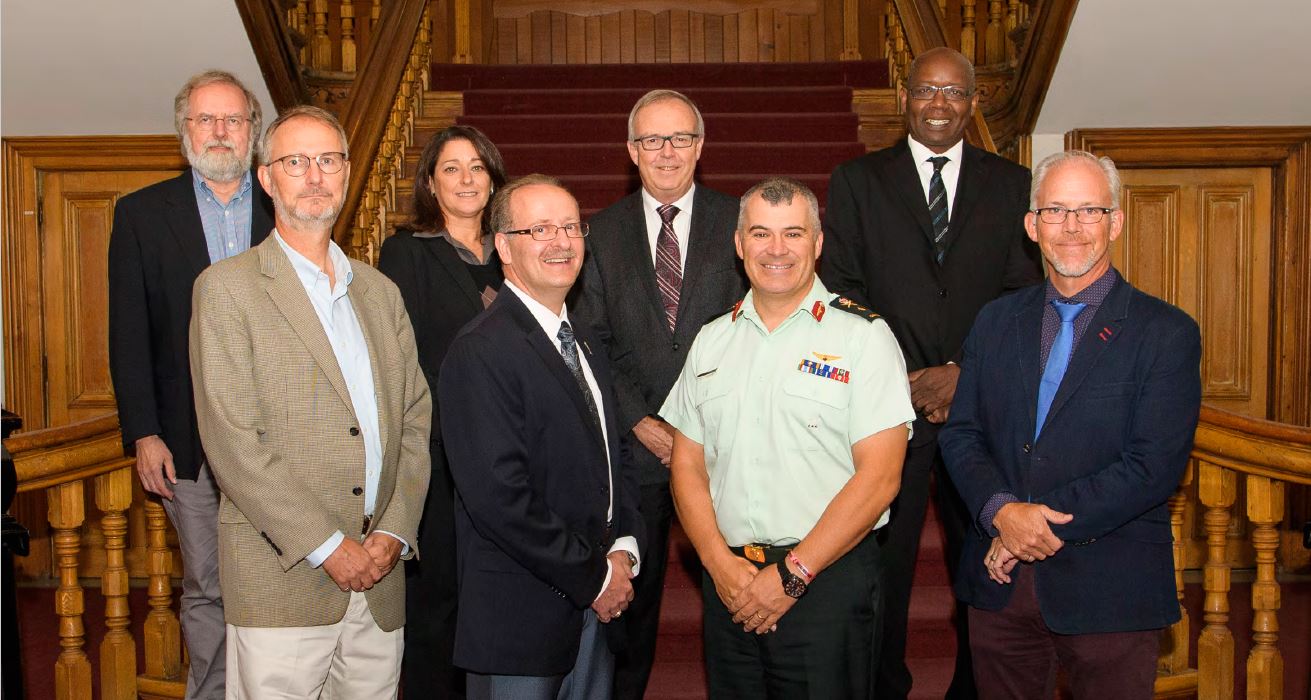
Advancing Inquiry-based Research
Remarkable contributors
Canada Research Chairs
The Canada Research Chairs Programme (CRCP) is at the centre of a national strategy to make Canada one of the world’s top countries in research and development. In 2000, the Government of Canada created a permanent programme to establish 2,000 Canada Research Chairs across nearly 80 participating Canadian universities. The CRCP invests approximately $265 million per year to attract and retain some of the world’s most accomplished and promising minds, including five at RMC.
Tier 1 (since 2002)
Professor Yahia M. Antar PhD
Canada Research Chair in Electromagnetic Engineering
Granted by the Natural Sciences and Engineering Research Council

Dr. Antar, from the Department of Electrical and Computer Engineering, is highly distinguished and internationally recognized in the field of Electromagnetic Engineering. His leading edge research explores innovations in microwave and millimetre wave antennas, components and circuits for communication purposes. His research is of vital importance to the training of highly qualified personnel as there is a continuous demand for expertise by Canadian industries and government institutions. Dr. Antar is a Life Fellow of the Institute of Electrical and Electronic Engineers, a Fellow of the Engineering Institute of Canada and a recipient of the Queen’s Diamond Jubilee Medal.
Tier 1 (since 2015
Professor Douglas Delaney CD, PhD, FRHistS
Canada Research Chair in War Studies
Granted by the Social Sciences and Humanities Research Council
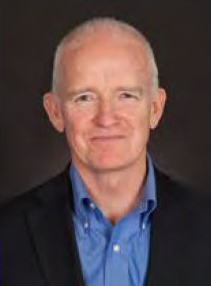
Dr. Delaney is a former member of the CAF whose lengthy military career included three operational tours. A graduate of RMC, he completed an initial degree in history and later returned to pursue a master’s and a doctorate in War Studies. His research focus is coalition warfare, examining how the militaries of the British Empire and Commonwealth educated, trained and equipped themselves to work together during the first half of the twentieth century. With the recent war in Afghanistan, his work is relevant because it expands our understanding of how military coalitions function in war and peace and promises to yield important findings that could inform Canada’s future coalition operations.
Tier 2 (since 2015)
Professor Valérie Langlois PhD
Canada Research Chair in Ecotoxicogenomics and Endocrine Disruption
Granted by the Natural Sciences and Engineering Research Council
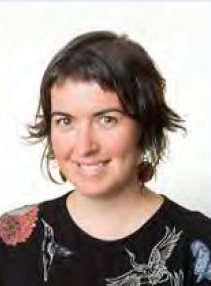
Dr. Langlois joined the Department of Chemistry and Chemical Engineering in 2011 and four years later, her outstanding research contributions earned her a Tier 2 Canada Research Chair. Every day, toxic molecules from common products like soap, plastic bottles, and drugs are released into wastewater and some infiltrate into our lakes, rivers, and drinking water. Langlois’ research focuses on how these environmental contaminants affect the health of vertebrates. Dr. Langlois and her team of researchers are developing new diagnostic tools to help governments to protect both Canadians and Canadian ecosystems from these harmful contaminants.
Tier 2 (since 2015)
Professor Cecile Malardier-Jugroot PhD
Canada Research Chair in Self-assembly and Nanomaterials
Granted by the Natural Sciences and Engineering Research Council
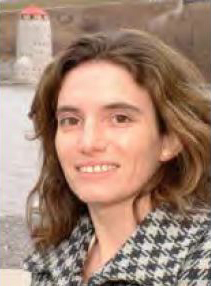
Dr. Cecile Malardier-Jugroot is also a Canada Research Chair emanating from the Department of Chemistry and Chemical Engineering. With a research focus in Self-assembly and Nanomaterials, she aims to deepen her understanding of how polymers (larger molecules composed of many similar subunits bonded together) self-assemble under environmentally friendly conditions. Her research will help develop new avenues for synthesizing nanoreactors, as mimic of efficient biosystems. Her research programme takes a multi-pronged approach, combining molecular modelling, synthesis, and experimental characterization methods. This research will lead to improvements in sustainable energy use and provide new, more effective drug delivery systems.
Tier 2 (since 2007)
Professor Xiahua Wu PhD
Canada Research Chair in Aeronautical Fluid Mechanics
Granted by the Natural Sciences and Engineering Research Council

A professor with the Department of Mechanical and Aerospace Engineering, Dr. Wu’s interest is performing world-class fluid mechanics research that can penetrate into undergraduate and graduate text books. Specifically, his group studies boundary layer flow, pipe flow as well as military-relevant jet engine flow, missile flow, and destroyer flow. During his Tier-2 CRC tenure, Dr. Wu was elected as Fellow of the American Physical Society and as Associate Fellow of the American Institute of Aeronautics and Astronautics. One of his RMC doctoral students has become a faculty member in a top Canadian university.
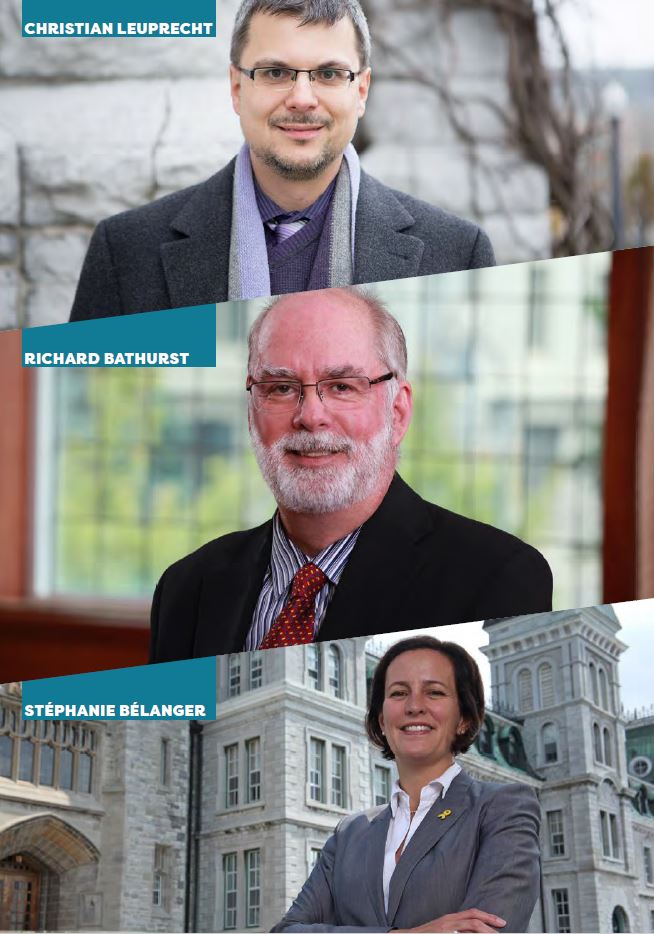
Remarkable contributors
The Royal Society of Canada
RMC is proud to be associated with the Royal Society of Canada (RSC). The RSC was established under an Act of Parliament in 1883 as Canada’s National Academy, the senior collegium of distinguished scholars, artists and scientists in the country. Today, the Society counts over 2,000 Fellows that were peer-elected as the best in their field and who have been judged to “have made remarkable contributions in the arts, the humanities and the sciences, as well as in the Canadian public life.” Counted among them is Dr. Richard J. Bathurst (elected in 2017) who is Professor of Civil Engineering and where he has taught since 1980. Dr. Bathurst was recognized for his innovative and impactful contributions to the advancement and understanding of modern civil engineering geosynthetic reinforced earth retaining structures and slopes. Dr. Bathurst is also the recipient of numerous national and international awards highlighting his technical achievements. He is an elected Fellow of the Engineering Institute of Canada and the Canadian Academy of Engineering, and is currently President of the Engineering Institute of Canada.
The RSC recently created a fourth entity (along with the current Academies of the Arts and Humanities, of Social Sciences, and of Science) – called the College of New Scholars, Artists and Scientists. It is Canada’s first national system of multidisciplinary recognition for the emerging generation of Canadian intellectual leadership. In 2016, Professors Stéphanie Bélanger, CD and Christian Leuprecht were identified as having demonstrated a high level of achievement at an early stage in their career and named as Members of the RSC College. Dr. Bélanger, from the Department of French, Literature, and Culture, is Chair of the Master of Public Administration programme, is a founder and Associate Director of CIMHVR, and is a specialist in the testimony of war, soldier identity, and military ethics. Dr. Leuprecht, from the Department of Political Science and Economics, is considered one of Canada’s most prolific scholars in the comparative study of security and defence and serves as the New Scholar’s representative on the RSC’s Finance Committee. He is the immediate past president of the International Sociological Association’s Research Committee 01: Armed Forces and Conflict Resolution and has been twice awarded the RMC Commandant’s Commendation for Excellence in Service.
Remarkable contributors
The Governor General’s Academic Medal
The Governor General’s Academic Medal was first awarded in 1873 by the Earl of Dufferin – Canada’s third Governor General after Confederation – and has since become the most prestigious award that a student in a Canadian educational institution can receive. The Governor General of Canada continues this tradition of encouraging academic excellence across the nation and recognizing outstanding students. Over the last fourteen decades, more than 50,000 Academic Medals have been awarded to graduating students who have achieved the highest academic standing and are awarded at the Gold level for those in a Master’s or Doctoral degree programme.
The recipient of the Governor General’s Academic Medal at the Gold level for the year 2016-2017 is Sonya Bissegger. Dr. Bissegger completed a PhD in Chemistry and Chemical Engineering in the field of Environmental Science and Engineering and the title of her thesis was “Influence of Testosterone Metabolic Pathways on Development and Reproduction in Amphibians.” The Academic Medal and certificate were presented on 18 May 2017 at the 108th Convocation of the Royal Military College of Canada in Kingston, Ontario.
Some of the past recent recipients of the Governor General’s Academic Medal, Gold Level:
- 2006 Nicole Louise Armstrong
- 2007 Marc Dominic Carriere
- 2008 Daniel Roberts Morgan
- 2009 Benjamin Bruce Nasmith
- 2010 Aba Mortley
- 2011 Vincent Rémi Roberge
- 2012 Sébastien Gaboury
- 2013 Michael Nelson Groves
- 2014 Peter Francis Horan
- 2015 Justine Mathieu-Denoncourt
- 2016 Vincent Rémi Roberge

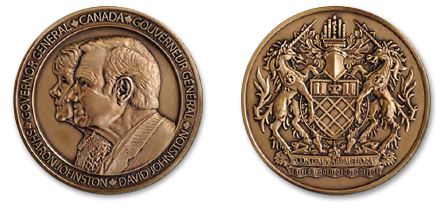
Remarkable contributors
The Cowan Prize for Excellence in Research
The Cowan Prize for Excellence in Research is the centrepiece for an annual public lecture, celebrating the accomplishments of the recipient. The prize is a monetary gift, managed by the RMC Foundation, and made possible through the generous endowment in 2000, of Dr. John Scott Cowan, former Principal at RMC (1999 - 2008). The prize was created as a means of highlighting the vast amount of research taking place at RMC. This prize not only increases public awareness of this research but also complements the other major annual academic prize at RMC, the Class of 65 Teaching Excellence Award, bringing symmetry to the university essentials of teaching and research excellence. When choosing recipients, the selection committee recognizes a member of faculty who has earned distinction through their scholarship, demonstrating the quality, originality, impact and quantity of the scholarly productivity of the researcher.
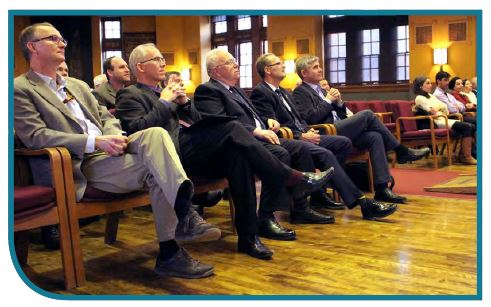
While the Cowan Prize for Excellence in Research is typically awarded to one person annually, in 2016, it jointly honoured Drs. Richard Bathurst of the Department of Civil Engineering and Claude Tardif of the Department of Mathematics and Computer Science. As is the custom, each presented a lecture to faculty, staff, students and friends of RMC on Tuesday, 8 November 2016, in the historic Currie Hall – named after Lieutenant-General Sir Arthur Currie who commanded the Canadian Corps during the Great War. Dr. Bathurst’s talk was entitled, “Adventures with Ziggurats, Plastic walls, Earthquakes, Polar bears and Tsunamis.” He spoke about his experience and contributions to research projects around the world that demonstrate the use of geosynthetics to improve the performance of geotechnical earth structures. Dr. Tardif’s talk was entitled, “Mathematics and Electoral Reform” and his presentation addressed ways in which electronic ballots can be published so that every voter can confirm his or her vote is counted, yet prevent the receipt from revealing for whom the vote was cast, thus ensuring anonymity and precluding buying or coercing votes.
Past Recipients:
- 2001 Roy Poitier
- 2002 Richard John Bathurst
- 2003 Yahia Antar
- 2004 JC (Brian) mckercher
- 2005 Joel Sokolsky
- 2006 Paul Rochon
- 2007 Brent Lewis
- 2008 Ken Reimer
- 2009 Jane Errington
- 2010 Dhamin Al-Khalili
- 2011 Adam Chapnick
- 2012 David Wehlau
- 2013 Keith Nelson
- 2014 Xiohua Wu
- 2015 Yahia Antar
 Left to right: Dr. Harry Kowal, Dr. Claude Tardif, Dr. Richard Bathurst and Dr. John Cowan.
Left to right: Dr. Harry Kowal, Dr. Claude Tardif, Dr. Richard Bathurst and Dr. John Cowan.Remarkable contributors
The Three Minute Thesis (3MT®)

The Three Minute Thesis (3MT®) is an annual academic competition for graduate students in which participants present their research and its wider impact in 3 minutes or less. The challenge is to present complex research in an engaging, accessible, and compelling way, using only one static slide. The competition also enables students to showcase their research to a wider multidisciplinary audience and to the broader public. This is a unique opportunity to communicate the innovative and significant research undertaken by the students!
The 3MT® competition initially was developed by The University of Queensland in 2008, with competitions by other Australian and New Zealand universities following, culminating in the first Trans-Tasman competition held in 2010. 3MT® also has spread internationally: from Japan to Europe, to Canada and the United States. The University of British Columbia ran the first Canadian competition in 2011; Queen’s University and Western University held competitions in 2012. In 2013, sixteen Ontario universities sent representatives to the inaugural Ontario 3MT® competition at Queen’s. Due to its wide popularity over the last decade, competitions are now held in over 600 universities and institutions across 65 countries, including the Royal Military College of Canada since 2015. The main focus of RMC’s 3MT® is oriented around student development and learning how to effectively communicate complex research in less than 180 seconds.
RMC’s 3MT® 2017 competition was held on March 17, 2017 which included the participation of: Daniel Cruz, James Kim, Afaf Moumin, Stevan Ostojic, Luke Peristy, Tyler Reyno and Evan Veryard. Among these excellent presentations, the judges awarded the following prizes which were presented by Dr. Philip J. Bates, Vice-Principal Academic:

1st place and winner: ($300 Prize)
Stevan Ostojic, masc, Chemistry and Chemical Engineering
Presentation title: “Fixed Bed Drying of Brewer’s Spent Grain with Thermal Energy Storage”

2nd place: ($200)
Evan Veryard, MASc, Chemistry and Chemical Engineering
Presentation title: “The Stress Corrosion Cracking of Zircaloy-4”
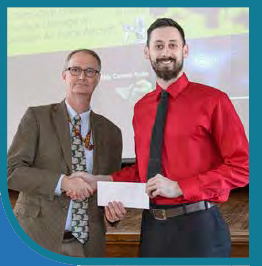
3rd place: ($100)
Tyler Reyno, MASc, Aeronautical Engineering
Presentation title: “Non-Destructive Evaluation of Surface Damage on Royal Canadian Air Force Aircraft”
Having won first place, Stevan Ostojic represented RMC at the Ontario 3MT® competition hosted by the University of Waterloo in April 2017. Most Ontario universities participate in the annual provincial competition. All of the cash prizes as well as the trip and registration fees to the provincial level competition were generously supported by the RMC Foundation and its donors.
A most sincere thanks of appreciation is due to all members of the judging panel: Dr. Forough Jahanbakhsh, School of Religion, Queen’s University; Pastor Dan Rooney, Deseronto Pentecostal Church; Carolina Pianezzola-Dahmer, 1st place winner of RMC’s 3MT, 2016; Dr. Nicole Bérubé, Department of Management and Economics, RMC; Major Michael Boire (Retired), Department of History, RMC; and Major David Holsworth, Department of Mechanical and Aerospace Engineering, RMC.

Our graduates
Note
This publication is available in both official languages.
